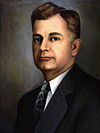Louisiana gubernatorial election, 1956
|
|
|||||||||||||||||||||||||||||||||||||||||||||||||||||||||
|---|---|---|---|---|---|---|---|---|---|---|---|---|---|---|---|---|---|---|---|---|---|---|---|---|---|---|---|---|---|---|---|---|---|---|---|---|---|---|---|---|---|---|---|---|---|---|---|---|---|---|---|---|---|---|---|---|---|
|
|||||||||||||||||||||||||||||||||||||||||||||||||||||||||
|
|||||||||||||||||||||||||||||||||||||||||||||||||||||||||
|
|||||||||||||||||||||||||||||||||||||||||||||||||||||||||
The Louisiana gubernatorial election of 1956 was held on January 17, 1956. The 1956 election saw the election of Earl K. Long to his second full term as Governor of Louisiana. He received over 50% of the vote, defeating his opponents so soundly that no runoff vote was needed.
Like most Southern states between the Reconstruction Era and the Civil Rights Movement, Louisiana's Republican Party was virtually nonexistent in terms of electoral support. This meant that the Democratic Party primary held on this date was the real contest over who would be governor.
Outgoing Governor Robert F. Kennon was constitutionally barred from succeeding himself. The candidates running to replace him were:
Long's campaign promises included spending increases to fund health, education, and other social programs. He made these promises on an extensive tour of the state, stopping in nearly every town to deliver theatrical speeches mocking his opponents. The acerbic Long attacked Morrison with particular enthusiasm, mocking his toupee and fancy suits and calling him "as slick as a peeled onion", out of touch with residents of small towns and rural areas. Long also mocked his unusual first name: "Ole De la Soups is the only man that can talk out of both sides of his mouth, whistle, and strut all at once." In addition to his usual base, Long also won support from corrupt rural sheriffs who were angry at their loss of gambling revenues after Kennon's reforms and Grevemberg's raids.
Despite the reluctance of Morrison's own Crescent City Democratic Association, the New Orleans mayor was overly optimistic at his chances. Morrison had expected the support of Governor Kennon, but did not get it; Morrison had endorsed Kennon's opponent Hale Boggs in the first primary of the 1952 election. Long encouraged false optimism in Morrison's campaign by having his rural supporters write to the New Orleans mayor urging him to run for governor. This false rural support never materialized in the actual election; Morrison was too unfamiliar with the state's rural politics and fought a perception of urban sophistication that did not play well in the country. His emphasis on his record as mayor and his promises of economic development found little resonance with rural voters.
...
Wikipedia


